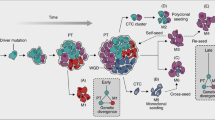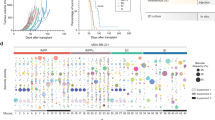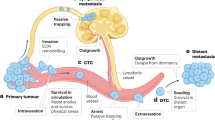Abstract
The issue of whether metastases result from the random survival of cells released from the primary tumour or from the selective growth of specialized subpopulations of cells having properties that allow them to complete the metastatic process is important to our understanding of tumour biology1,2. Previous studies have provided indirect evidence that the process of metastasis favours the survival of cells having a metastatic phenotype(s)3–8. Direct evidence that the process is selective would be provided by the demonstration that cells populating spontaneous metastases are, in general, more metastatic than most of the parent tumour cells; some9–11, but not all12,13, previous reports have failed to provide such evidence, suggesting that the process is random. These discrepancies could be due to differences in the biological characteristics of the various tumour systems studied and in the experimental conditions14. In the present study, these variables were minimized by using three metastatic variant cell lines of the B16 melanoma. We report that, even in controlled conditions, the process of metastasis can appear as either selective or random depending on the nature of the initial population. Specifically, metastasis by the unselected, poorly metastatic parent B16 tumour was indeed selective. In contrast, metastasis by previously selected B16 lines appeared to be random.
This is a preview of subscription content, access via your institution
Access options
Subscribe to this journal
Receive 51 print issues and online access
$199.00 per year
only $3.90 per issue
Buy this article
- Purchase on Springer Link
- Instant access to full article PDF
Prices may be subject to local taxes which are calculated during checkout
Similar content being viewed by others
References
Fidler, I. J. & Kripke, M. L. Science 197, 893–895 (1977).
Poste, G. & Fidler, I. J. Nature 283, 139–146 (1980).
Nicolson, G. L. & Winkelhake, J. L. Nature 255, 230–232 (1975).
Briles, E. B. & Kornfeld, S. J. natn. Cancer Inst. 60, 1217–1222 (1978).
Brunson, K. W., Beattie, G. & Nicolson, G. L. Nature 272, 543–545 (1978).
Tao, T. W. & Burger, M. M. Nature 270, 437–438 (1977).
Talmadge, J. E., Meyers, K. M., Prieur, D. J. & Starkey, J. R. Nature 284, 622–624 (1980).
Raz, A. & Hart, I. R. Br. J. Cancer 42, 331–341 (1980).
Giavazzi, R., Alessandri, G., Spreafico, F., Garattini, S. & Mantovani, A. Br. J. Cancer 42, 464–472 (1980).
Mantovani, A., Giavazzi, R., Alessandri, G., Spreafico, F. & Garattini, S. Eur. J. Cancer 17, 71–76 (1981).
Eccles, S. A., Heckford, S. E. & Alexander, P. Br. J. Cancer 42, 252–259 (1980).
Stackpole, C. W. Nature 289, 798–800 (1981).
Raz, A., Hanna, N. & Fidler, I. J. J. natn. Cancer Inst. 66, 183–189 (1981).
Fidler, I. J. Meth. Cancer Res. 15, 399–439 (1978).
Fidler, I. J. Nature new Biol. 242, 148–149 (1973).
Hart, I. R. Am. J. Path. 97, 587–600 (1979).
Nicolson, G. L. & Custead, S. E. Science 215, 176–178 (1982).
Fidler, I. J. & Nicolson, G. L. in Cancer Biology Reviews (eds Marchalonis, J., Hanna, M. G. Jr & Fidler, I. J.) 171–234 (Marcel-Dekker, New York, 1981).
Trope, C. in Design of Models for Testing Cancer Therapeutic Agents (eds Fidler, I. J. & White, R. J.) 62–79 (Van Nostrand Reinhold, New York, 1981).
Fidler, I. J. & Hart, I. R. Cancer Res. 41, 3266–3267 (1981).
Miller, R. G. Jr Simultaneous Statistical Inference, 6–10, 167 (McGraw-Hill, New York, 1966).
Author information
Authors and Affiliations
Rights and permissions
About this article
Cite this article
Talmadge, J., Fidler, I. Cancer metastasis is selective or random depending on the parent tumour population. Nature 297, 593–594 (1982). https://doi.org/10.1038/297593a0
Received:
Accepted:
Issue Date:
DOI: https://doi.org/10.1038/297593a0
This article is cited by
-
The Brain Microenvironment and Cancer Metastasis
Molecules and Cells (2010)
-
The role of microenvironment in tumor angiogenesis
Genes & Nutrition (2008)
-
Clonal diversity in carcinomas: its implications for tumour progression and the contribution made to it by epithelial-mesenchymal transitions
Clinical & Experimental Metastasis (2008)
-
Inhibition of established subcutaneous and metastatic murine tumors by intramuscular electroporation of the interleukin-12 gene
Journal of Biomedical Science (2003)
Comments
By submitting a comment you agree to abide by our Terms and Community Guidelines. If you find something abusive or that does not comply with our terms or guidelines please flag it as inappropriate.



